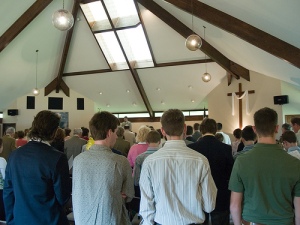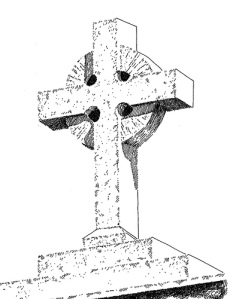We recently had vacation Bible school at our church. The leaders and 20 children gathered in the evenings and opened and closed the sessions with singing, dancing and celebration. We did actions to the songs along with the accompaniment of recorded bands and it didn’t matter if we got the words wrong occasionally, came in at the wrong times or forgot the actions because we were rejoicing before God. Now think back to the last time that people in your services of worship jumped up and down, clapped along with the music, waved their arms in the air or acted out the loving embrace of God. Has this ever happened during your Sunday morning services? Has it even happened on special occasions?
In the OT dancing was a form of religious worship and community celebration. Dancing and singing and playing instruments were part of public rituals and festivals as part of communal worship. Dancing was the opposite of mourning, was a way of greeting warriors and victors home. Men danced, women danced, it was a way to worship God with your whole mind and body. Where did our dancing go?
In 2 Samuel 6 King David danced in the streets. In the OT several words are used to refer to dancing. The one used in our reading today was only used in this one place in the Bible and means “whirling.” Other words for dance referred to writhing, whirling, and skipping about. This is not the kind of practiced dancing that we see on such shows as So You Think You Can Dance. Anyone could whirl, and skip about. This speaks of a sort of primal movement, like that of children who are so excited at the arrival of a special guest that they cannot keep still. Is this not how we should be greeting God?
Why was David dancing in the first place? David had consolidated his rule and set his capitol in Jerusalem but it was not truly the center of Judah and Israel because the Ark of the Covenant of God was the center for their religion and it was not in Jerusalem. David decided that it was time to bring the Ark to the capitol. Our reading this morning had two sections separated by five verses. The move of the Ark of the Covenant did not go as smoothly as David would have liked. He gathered 30,000 men including the Levite priests and set off from Baale-judah. Things started out fine with the Ark on a new cart and being cared for by the Levites, but it ended up being left in the house of Obed-edom after Uzzah touched the Ark to steady it on the cart and was struck dead by God. David decided it was too dangerous to take into the city. After three months he was told that the household of Obed-edom had been richly blessed by the presence of the Ark and once again he set out to bring it home.
On both stages of the journey there was dancing. From Beele-judah we read that David and the people of Israel danced before the Lord with all their might. On the second leg David left off his kingly robes and wore an ephod , probably over his tunic, and danced with all his might before the Lord. Imagine the scene. The king who had united all Israel, defeated the Philistines was not being carried on a litter, not riding a fine horse, not marching solemnly but skipping and whirling around on the streets in little more than his underclothes!
There has been a lot of speculation about the scene I just described. First there is an issue of exactly what he was wearing. The Bible says that, “David was girded with a linen ephod.” It does not say that David was naked except for the ephod. Some have speculated that he was basically naked, others that he was wearing a loin cloth of sorts, others that he was humbling himself and becoming as one with the people.
The ephod was a piece of priestly clothing made of two rectangular pieces of linen which are held together at the shoulder with buckles. Priests would have worn this over their underclothes and tunics and for the high priest under a fantastic jewelled breast plate. This was priestly garb, worn exclusively by those who served as priests. For David to remove his fine robes and signs of his sovereignty was definitely humbling, but taking up the ephod may be seen as taking for himself also the role of a religious leader as well.
Significant as all that may be, I believe that the issue of his behaviour on this journey bears more attention. As I mentioned above, David was not behaving in what we would consider a respectable kingly manner. He was not riding a fine horse, he was not puffing himself up to appear important and be admired by bystanders. Does this sound familiar at all? This King David, from whose line Jesus would later be born, was more like Jesus in this march.
And David danced! With intention and also with abandon he danced to worship the Lord and to greet the Ark of the Covenant into Jerusalem in the same way that people danced to welcome home victorious soldiers. Such a spectacle did he make of himself that his wife, Saul’s daughter Michal, saw it she was disgusted and turned away. If we continued to read to her greeting her husband home she rebuked him for “shamelessly uncovering himself before the eyes of his servants’ maids.” David defends his action by saying, “It was before the Lord, who chose me in place of your father and all his household, to appoint me prince over Israel, the people of the Lord that I have danced before the Lord.”
When did dancing change from being a primary act of worship to being something that some denominations actually consider a sin? Even by the time of the New Testament dancing is no longer associated with worship. It is still a celebratory act but more secular in nature. Even as the people of Israel were dancing to the Lord, those of the polytheistic religions were dancing to their gods. Perhaps the change began as a way of differentiating themselves from the polytheists. Over time dance, now a secular activity, took on other purposes. We know that the nature religions dance in ceremonies, that there are dances used to whip up fighting spirit before battle, that dance is used for seduction, for spectacle, for art. But we no longer dance.
I am not really suggesting that we need to be literally dancing in the streets in praise of God, nor am I suggesting that we need to clear dance space in our places of worship. But I do think that there is something of the being physically swept up in worship that has dried us out. Are we dancing in spirit? When we worship do we feel like skipping and whirling? When we leave church after a service do we feel light on our feet? When was the last time you felt so excited you just couldn’t be still?
There is a very popular quote from Mark Twain about dancing which seems to fit well here.
“Dance like nobody’s watching
Love like you’ve never been hurt
Sing like nobody’s listening
Live like it’s heaven on earth.”
If we are dancing with all our might before the Lord then it doesn’t matter who else sees us or what they think of our dancing skills. It doesn’t even matter if they think we are crazy for dancing! We really have something to sing about because, while this may not yet be heaven, we are already living the resurrection life.
2 Samuel 6: 1-19
 I recently had a horrible dream. It was the night before a new treatment started and over a series of very odd events in which scenes were short, intense, and highly charged. In very quick succession I experienced paralyzingly fear, violent rage, crushing grief, and generally amounts of confusion. And then the strangest thing happened.
I recently had a horrible dream. It was the night before a new treatment started and over a series of very odd events in which scenes were short, intense, and highly charged. In very quick succession I experienced paralyzingly fear, violent rage, crushing grief, and generally amounts of confusion. And then the strangest thing happened.





